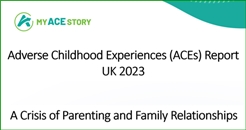 The devastating effect of divorce or separation on Adverse Childhood Experiences
The devastating effect of divorce or separation on Adverse Childhood Experiences
From a report by My ACE Story
My ACE Story has published a report on insights into ACE research, "Adverse Childhood Experiences (ACEs) Report UK 2023" with a subtitle, "A Crisis of Parenting and Family Relationships".
Two surveys were conducted by My ACE Story across the UK from May to Sept 2023 to try to understand ACEs further.
One survey of 2000 individuals which was self-selecting and the results are very different than previous UK studies. One could argue they are voices of Lived Experience.
To counter the Lived Experience sample biases, a small National representative survey was also run using the same survey and the results compared to the Lived Experience results.
Many insights were identified, including:
The devastating effect of family instability on ACEs
In the Lived Experience sample, the median number of ACEs of those who did not experience their parents separating or divorcing is 3. This compares to 5 for those who did experience their parents separating and/or divorcing.
In the National sample, the median number of ACEs of those who did not experience their parents separating or divorcing is 1. This compares to 4 for those who did experience their parents separating and/or divorcing.
What ACEs increase?
In the Lived Experience sample:
-
35% of those whose parents separated or divorced experienced neglect vs 17% whose parents stayed together.
-
56% lived with a household member who misused alcohol or drugs vs 29%.
-
71% lived with a household member who was depressed, mentally ill or suicidal vs 54%.
-
81% saw or heard a parent in your home yelled at, insulted or humiliated or beaten vs 61%.
-
34% experienced unwanted sexual contact (not necessarily in the home) vs 23%.
In the National sample:
-
23% of those whose parents separated or divorced experienced neglect vs 9% whose parents stayed together.
-
45% lived with a household member who misused alcohol or drugs vs 19%.
-
47% lived with a household member who was depressed, mentally ill or suicidal vs 25%.
-
62% saw or heard a parent in your home yelled at, insulted or humiliated or beaten vs 37%.
-
13% experienced unwanted sexual contact (not necessarily in the home) vs 6%.
Other insights include:
-
Mental health and drug issues in the household in both samples have increased over time.
-
Physical violence against the child in both samples has decreased over time.
-
In both samples, the more ACEs, the more visits to GP in a 12 month period and more medical conditions discussed. Individuals with zero ACEs visited a GP on average once in the last 12 months. This increases to 3 times for those with 7-10 ACEs. The number of conditions discussed rises from 1 to 2.5.
-
In both samples, the more ACEs, the more that certain medical conditions increase. The top conditions reported are; Anxiety, Depression, Allergies, Asthma and Heart Conditions. For example, in the Lived Experience sample, 23% of those with zero ACEs reported discussing Anxiety with a GP. This rose to 68% for those with 7-10 ACEs. In the National sample, the similar figures were 15% and 53%. Figures for Depression are 16% rising to 67% for the Lived Experience sample and 7% to 37% for the National sample.
Individuals, communities and society therefore pay a huge cost in dealing with the effect of ACEs - wasted lives, premature death, effect on communities e.g. anti-social behaviour, healthcare, justice, education, social services costs.
There is a lot of participation around ACEs by professionals – educators, academics, health services, social services, etc., but little focus on and involvement of parents and communities. This has led to a great deal of cost and effort on reducing the effect of ACEs once they have occurred rather than prevention in the first place i.e. dealing with the root causes.
Thinking root causes, how do we successfully engage one of these groups in preventing some ACEs in the first place, in a low-cost way?:
-
youth (future parents),
-
parents,
-
caregivers e.g. grandparents
Thirteen ideas are presented in the report for the prevention (and reduction) of ACEs (at what would be a much lower cost to the taxpayer).
We, as a society, could continue to focus on handling the results of ACEs at great cost, not only in money but also in wasted lives. We must move to prevention to address the root causes if we are to create a society where people thrive and reach their full potential.
Download the report.
If we want to address the root causes of many personal and societal issues, the Church has got a great role to play here, especially given their links to parents and toddlers, education and community. Why not take up the Resilience Challenge in 2024?
Retweet about this article:
From a report by My ACE Story, 19/12/2023